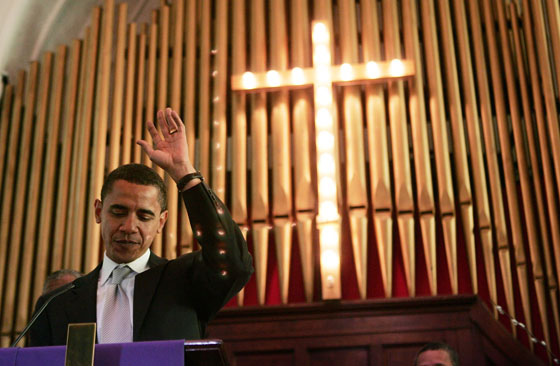
Obama an unlikely source for (surprise) spiritual leadership
given his lonely upbringing, essentially without much religion or faith input
W.E.B. Du Bois tells of the music and songs and spontaneous "poetry" of the Black folk in American history, how in their Spirit-filled expressions and outpourings "they grope toward some unseen power and sigh for rest in the End."
Dubois notes, "Like all primitive folk, the slave stood near to Nature's heart." John Trasker Howard also comments on the spontaneity of the black churches throughout the nineteenth century, their reputation among whites for a gift of inspired musical poetry and expressiveness, the heartfelt sincerity of their religion and talent for song. Howard also notes the profound ultimate influence of much of the black experience into mainstream Americana, eventually permeating the national totality almost blanketing America, beginning with the lower religious strata and finally even into the elites.
Within the American story, the irony is this: Who would have been able to predict that, in the end, this spontanaeity and freshness, initially despised by the staid congregationalists, would one day revitalize American Christianity and indelibly stamp the character of American culture..
W.E.B. Dubois: The Negro's Natural Religious Giftedness ~ His Natural 'Pentecostalism' and Enthusiasm
"The Negro has already been pointed out many times as a religious animal, -- a being of that deep emotional nature which turns instinctively toward the supernatural. Well endowed with a rich tropical imagination and a keen, delicate appreciation of Nature, the transplanted African lived in a world animate with [spirit forces and beings]....... He called up all the resources of heathenism to aid, -- exorcism and witchcraft, the mysterious Obi worship with its barbarous rites, spells, weird midnight 'orgies' and mystic conjurations."Lest we forget : Molefe Asante and many others : you.tube
In the South, particularly, the religion of the lower class whites has been heavily influenced by Black religion. This is nowhere more evident than in songs and music, where the white version ofttimes is a "plain copy" (often not for the better) of a Black one.
Du Bois speaks of the importance of Black religion, and comments on the style of it, so often despised by outsiders. He notes the "Frenzy or 'Shouting,' when the Spirit of the Lord passed by, and. seizing the devotee, made him mad with supernatural joy." This element of Negro religion "varied in expression from the silent rapt countenance or the low murmur and moan to the mad abandon of physical fervor, -- the stamping, shrieking, and shouting, the rushing to and fro and wild waving of arms, the weeping and laughing, the vision and the trance. All this is nothing new in the world, but old as religion, as Delphi and Endor. And so firm a hold did it have on the Negro, that many generations firmly believed that without this visible manifestation of the God there would be no true communion with the Invisible." [Du Bois, pp 141-2, The Souls of Black Folk. paperback]
Speaking of the long, sad history of interracial relations throughout America's past:"The red stain of Bastardy, which two centuries of systematic defilement of Negro women had stamped upon [the Negro's] race, meant not only the loss of ancient African chastity, but also the hereditary weight of a mass of corruption from white adulterers, threatening almost the obliteration of the Negro home."
We have much to offer our country:
We the darker ones come even now not altogether empty-handed: there are to-day no truer exponents of the pure human spirit of the Declaration of Independence than the American Negroes; there is no true American music but the wild sweet melodies of the Negro slave; the American fairy tales and folk-lore are Indian and African; and, all in all, we black men seem the sole oasis of simple faith and reverence in a dusty desert of dollars and smartness. Will America be poorer if she replace her brutal dyspeptic blundering with light-hearted but determined Negro humility? or her coarse and cruel wit with loving jovial good-humor? or her vulgar music with the soul of the Sorrow Songs?" [Du Bois, p 22 The Souls of Black Folk. paperback. "On Our Spiritual Strivings"

Richard Dawkins quotes Victor Stenger (The Unconscious Quantum) quoting psychiatrist Patricia Newton (her lecture on "Afrocentric Healing") that traditional healers "are able to tap into that other realm of negative entropy -- that superquantum velocity and frequency of electromagnetic energy and bring them as conduits down to our level. It's not magic. It's not mumbo-jumbo. You will see the dawn of the twenty-first century, the new medical quantum physics reallty distributing these energies and what they are doing.
But Dawkins, very self-consciously and outspokenly an atheist and a rationalist, rejects such healing as fraudulent.
